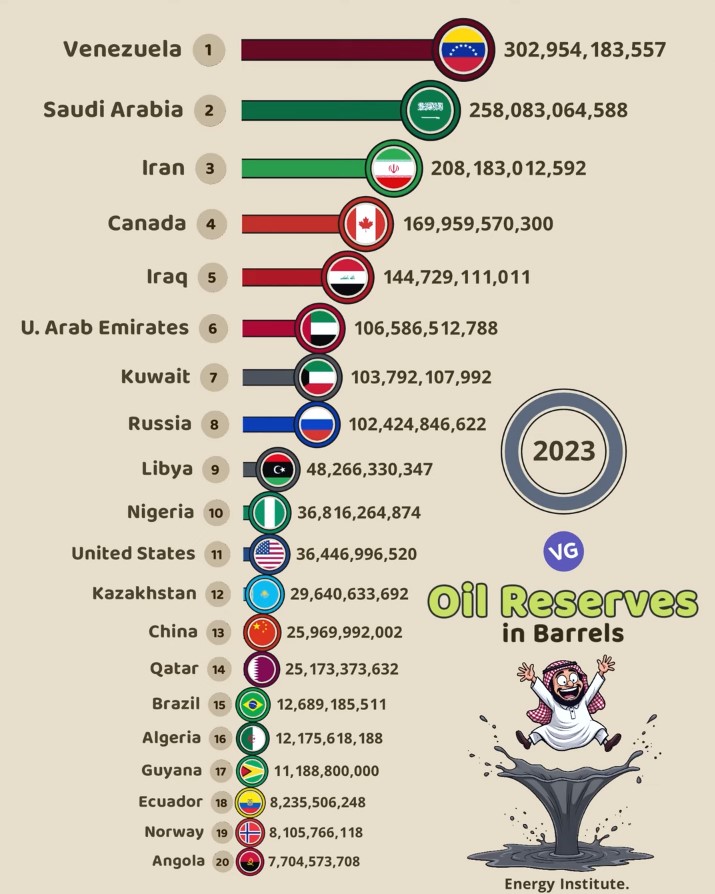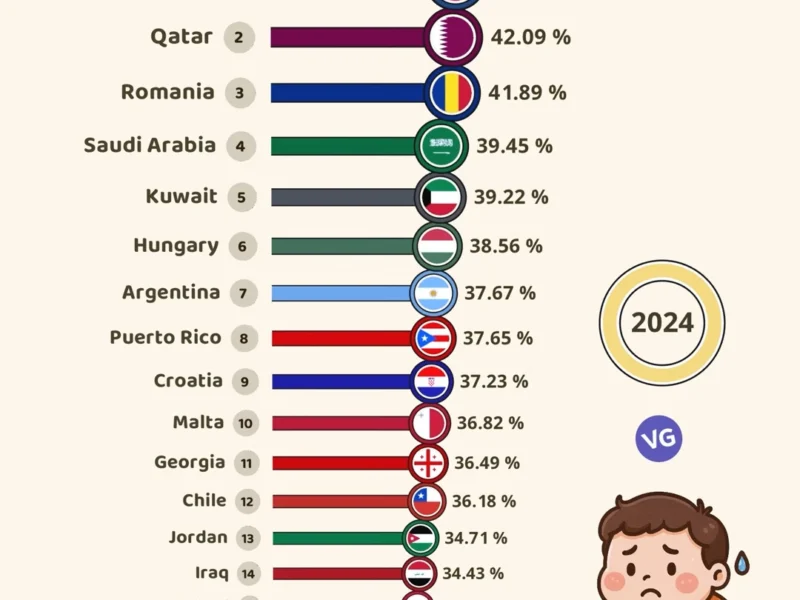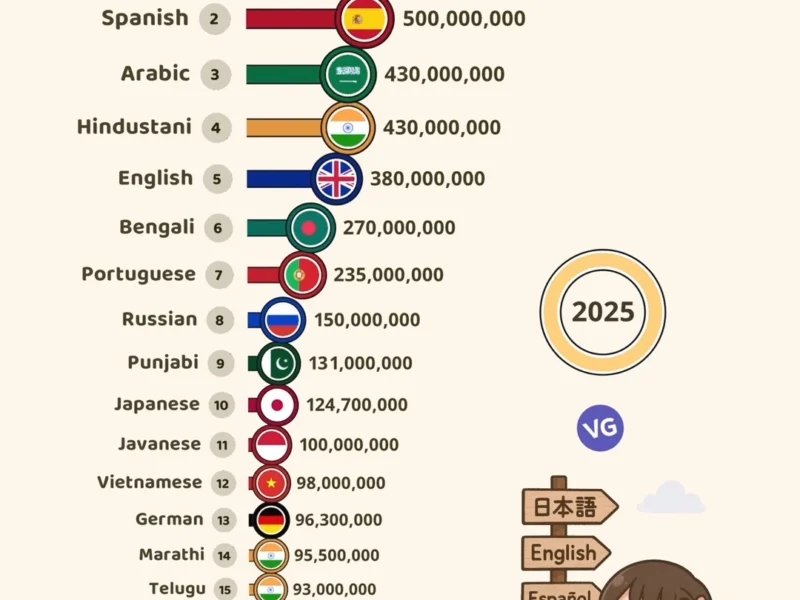In today’s world, energy is key. A surprising fact shows that just ten countries have over 80% of the world’s oil. Venezuela tops the list with 303.22 billion barrels of oil reserves. This shows how important oil is in world politics.
Oil reserves are more than just numbers. They shape global relations, economies, and energy plans. The top three countries – Venezuela, Saudi Arabia, and Iran – have almost 780 billion barrels of oil. They are key players in the world’s energy scene.
Oil Reserves by Country 2023 (in Barrels)
| Rank | Country | Reserves |
|---|---|---|
| 1 | 🇻🇪Venezuela | 302,954,183,557 |
| 2 | 🇸🇦Saudi Arabia | 258,083,064,588 |
| 3 | 🇮🇷Iran | 208,183,012,592 |
| 4 | 🇨🇦Canada | 169,959,570,300 |
| 5 | 🇮🇶Iraq | 144,729,111,011 |
| 6 | 🇦🇪U. Arab Emirates | 106,586,512,788 |
| 7 | 🇰🇼Kuwait | 103,792,107,992 |
| 8 | 🇷🇺Russia | 102,424,846,622 |
| 9 | 🇱🇾Libya | 48,266,330,347 |
| 10 | 🇳🇬Nigeria | 36,816,264,874 |
| 11 | 🇺🇸United States | 36,446,996,520 |
| 12 | 🇰🇿Kazakhstan | 29,640,633,692 |
| 13 | 🇨🇳China | 25,969,992,002 |
| 14 | 🇶🇦Qatar | 25,173,373,632 |
| 15 | 🇧🇷Brazil | 12,689,185,511 |
| 16 | 🇩🇿Algeria | 12,175,618,188 |
| 17 | 🇬🇾Guyana | 11,188,800,000 |
| 18 | 🇪🇨Ecuador | 8,235,506,248 |
| 19 | 🇳🇴Norway | 8,105,766,118 |
| 20 | 🇦🇴Angola | 7,704,573,708 |
Knowing about global oil reserves helps us understand future energy needs. In 2023, the world used 102.2 million barrels of oil daily. This shows how vital these reserves are. The fight for energy power drives global politics and investments.
From Canada’s oil sands to the Middle East’s oil fields, each country’s story is unique. The ranking of oil reserves is not just about how much oil. It’s also about the economic and political power it brings to the world.
Understanding Global Oil Reserves and Their Economic Impact
The world’s oil resources are complex and always changing. Proven reserves are key to a country’s economy and the global energy market. Knowing how oil reserves work helps us understand the world’s economy and politics.
Proven reserves are the oil we can get out now with today’s tech and money. These numbers change as new tech comes along, market shifts, and more exploration happens.
What Defines Proven Oil Reserves
To figure out proven reserves, we look at a few important things:
- How sure we are the oil is there
- If we can get it out
- If it’s worth getting out
- If it meets government rules
Economic Significance of Oil Reserves
Oil reserves are very important for a country’s economy. Some countries make a lot of money from oil. The oil economics of a country can change a lot because of its oil.
“Proven reserves are the backbone of energy security and economic planning for resource-rich nations.” – Energy Policy Analyst
OPEC’s Role in Global Oil Markets
OPEC has a big say in the world’s oil markets. With about 80% of the world’s oil, OPEC helps keep prices stable and manages how much oil is out there.
Recent numbers show how important oil is. The world is expected to use more oil by 2025. This shows how crucial oil resources are for the future.
Top Three Oil Giants: Venezuela, Saudi Arabia, and Iran

The world’s oil is mainly controlled by three big players: Venezuela, Saudi Arabia, and Iran. Together, they hold 50% of the world’s known oil reserves. Each country faces its own set of challenges and plays a key role in the global energy scene.
Venezuela has the largest oil reserves, with 303 billion barrels. Yet, it struggles with oil production. Economic troubles and lack of investment have cut production from 2 million barrels a day in the 1990s to 400,000 today.
Saudi Aramco leads Saudi Arabia’s oil industry. The country has about 297 billion barrels of oil reserves. It produces around 10 million barrels a day. Saudi Arabia’s role in OPEC gives it a big say in oil prices worldwide.
“Oil is the lifeblood of our economy and a critical global commodity.” – Anonymous OPEC Representative
The Iranian oil industry has faced big hurdles due to sanctions. Iran has around 157 billion barrels of oil reserves. It produces about 3 million barrels a day. Despite these challenges, Iran looks to grow its market share in Asia.
Comparative Oil Reserve Analysis
| Country | Proven Reserves (Billion Barrels) | Global Reserve Percentage | Daily Production (Barrels) |
|---|---|---|---|
| Venezuela | 303 | 17% | 400,000 |
| Saudi Arabia | 297 | 16% | 10,000,000 |
| Iran | 157 | 9% | 3,000,000 |
- Venezuela saw a 12% jump in oil exports in 2023
- Saudi Arabia keeps a strong grip on OPEC
- Iran’s oil sector finds ways to work around sanctions
North American Oil Powers: Canada and United States
North America is a key player in global energy. Canada and the United States are at the heart of this. Their unique geology and tech have made them major players in oil.

Canadian Oil Sands: A Massive Energy Reservoir
Alberta’s oil sands are a huge energy source for Canada. They hold about 163.63 billion barrels of oil. This makes Canada important in the global oil market.
The process of getting this oil is complex. But it has made Canada’s energy a key part of North America’s security.
- Alberta hosts the world’s largest oil sands reserves
- Extraction technologies continue to improve efficiency
- Environmental considerations drive innovative extraction methods
US Shale Oil Revolution: Transforming Energy Dynamics
The US shale oil boom has changed the game. New fracking methods have opened up vast oil fields. This has made the United States the top oil producer in the world.
Texas, North Dakota, and other states have led this change. They have transformed the US into a major energy player.
“The shale revolution has fundamentally altered the global energy landscape, positioning the United States as a key exporter and strategic energy player.” – Energy Experts
Production Capabilities and Export Markets
North America’s oil production is impressive. The United States alone produces about 11.9 million barrels of oil daily. This oil is sold to countries like Mexico and China.
This shows how important North America is for meeting global energy needs.
| Country | Daily Oil Production | Key Export Markets |
|---|---|---|
| United States | 11.9 million barrels | Mexico, China |
| Canada | 5.6 million barrels | United States, Global Markets |
North America’s energy production keeps getting better. It shows the region’s ability to adapt and innovate. It also highlights its strategic role in the world’s energy system.
The Countries with the Most Oil Reserves in the World 2024
The world’s oil scene is always changing. Countries rich in oil play big roles in our energy world. By 2024, the leaders in oil reserves show different amounts. This shows the complex mix of politics and economics.
Global oil reserves have dropped to about 1,500 billion barrels. This is 52 billion barrels less than last year. The drop comes from two main reasons:
- Production-related decreases: 30 billion barrels
- Resource adjustment reductions: 22 billion barrels
Looking at the top oil countries, we see some big players in oil:
| Rank | Country | Proven Reserves (Billion Barrels) |
|---|---|---|
| 1 | Saudi Arabia | 247 |
| 2 | United States | 156 |
| 3 | Russia | 143 |
| 4 | Canada | 122 |
| 5 | Iraq | 105 |
“The future of global energy depends on how these top oil reserve countries manage their resources and adapt to changing environmental demands.” – Energy Insights Report 2024
OPEC countries have about 657 billion barrels of oil reserves. This is about 40% of the world’s total. The oil world is always changing. Politics and new tech keep shifting the rankings.
Middle Eastern Oil Dominance: UAE, Kuwait, and Iraq
The Middle East is a key player in global oil production. It has strategic reserves that shape the world’s energy landscape. Countries like the UAE, Kuwait, and Iraq are at the heart of global energy markets because of the Persian Gulf reserves.
Middle East oil production is strong. Key nations show great economic potential. The region’s oil infrastructure has become more sophisticated and efficient.
Strategic Location Advantages
Middle Eastern countries have a unique geographical advantage:
- They are close to major shipping routes
- They have access to global maritime trade channels
- They are strategically connected between continents
Infrastructure Development
Investment in oil infrastructure has changed these nations. The UAE, Kuwait, and Iraq have worked hard to modernize their oil extraction and transport systems.
“Our oil infrastructure represents the backbone of our economic future” – Energy Minister of UAE
Future Production Plans
The region’s oil production plans are ambitious. They aim to expand and optimize output:
- The UAE plans to increase production capacity
- Kuwait is focusing on expanding its fields
- Iraq is developing new extraction technologies
By 2024, energy investment in the Middle East is expected to hit around USD 175 billion. This shows their commitment to leading the global energy market.
Conclusion
The world of oil is changing fast. Countries like Venezuela, Saudi Arabia, and Iran are key players in energy. New tech and green thinking are changing how we use oil.
The future of oil is tricky. Even as green energy grows, oil is still vital for our economies. Markets in Asia and Africa are leading the way, investing in new tech to use their oil better.
Big oil companies are getting greener. They’re using AI, big data, and new ways to get oil to be more efficient and kinder to the planet. The world’s politics will keep shaping oil markets, with new alliances and tech opening up chances for oil-rich countries.
As we move to use more kinds of energy, oil-rich nations need to think smart. They must use their oil wisely and also invest in green tech to stay ahead in the fast-changing energy world.
FAQ
Which country has the largest proven oil reserves in the world?
Venezuela leads with 303.22 billion barrels of proven oil reserves. However, it faces big challenges due to political issues and lack of investment.
What is the definition of proven oil reserves?
Proven reserves are the oil we can get now under current rules and costs. They are checked by groups like the US Energy Information Administration and OPEC.
How much of the world’s oil reserves does OPEC control?
OPEC has about 79.1% of the world’s oil reserves. This gives them a big say in global oil prices and markets.
Which Middle Eastern countries are major oil reserve holders?
Saudi Arabia, Iran, Iraq, United Arab Emirates, and Kuwait are big players. Saudi Arabia has 267.19 billion barrels, and Iran has 208.60 billion barrels.
How is the United States positioned in global oil reserves?
The United States is ninth with 55.25 billion barrels of reserves. But it leads in oil production, thanks to the shale boom in Texas and North Dakota.
What is the global oil demand in 2023?
In 2023, global oil demand hit 102.2 million barrels per day. This is more than before the pandemic, showing we still rely a lot on oil.
Are countries investing in alternative energy sources?
Yes, big oil companies like Exxon Mobil and Chevron aim for net-zero by 2050. They’re using new tech and strategies to meet environmental goals.
How do oil reserves impact national economies?
Oil reserves are key for many countries’ economies. Some make a lot of money from oil exports. The oil and gas market is set to grow to $8.67 trillion by 2027.
Source Links
- The World’s Largest Oil Reserves by Country In 2024
- Oil Reserves Definition
- Understanding the Forces Influencing Global Oil Markets in 2024 | DW Energy Group
- 2025 Oil and Gas Industry Outlook
- Venezuela: The Rise and Fall of a Petrostate
- Rystad: OPEC’s Oil Reserves are Much Lower Than Officially Reported | OilPrice.com
- No title found
- Oil Market Report – December 2024 – Analysis – IEA
- North America – Countries & Regions – IEA
- About U.S. Oil Production …
- Global recoverable oil reserves hold steady at 1,536 billion barrels; insufficient to meet demand without swift electrification
- 10 Countries With the Most Natural Resources
- Middle East – World Energy Investment 2024 – Analysis – IEA
- The Biggest Oil Producers in the Middle East
- List of Top 10 Countries with Major Global Oil Reserves%%page%% %%sep%% %%sitename%% – GeeksforGeeks
- Top 10 Countries With Largest Oil Reserves In World



